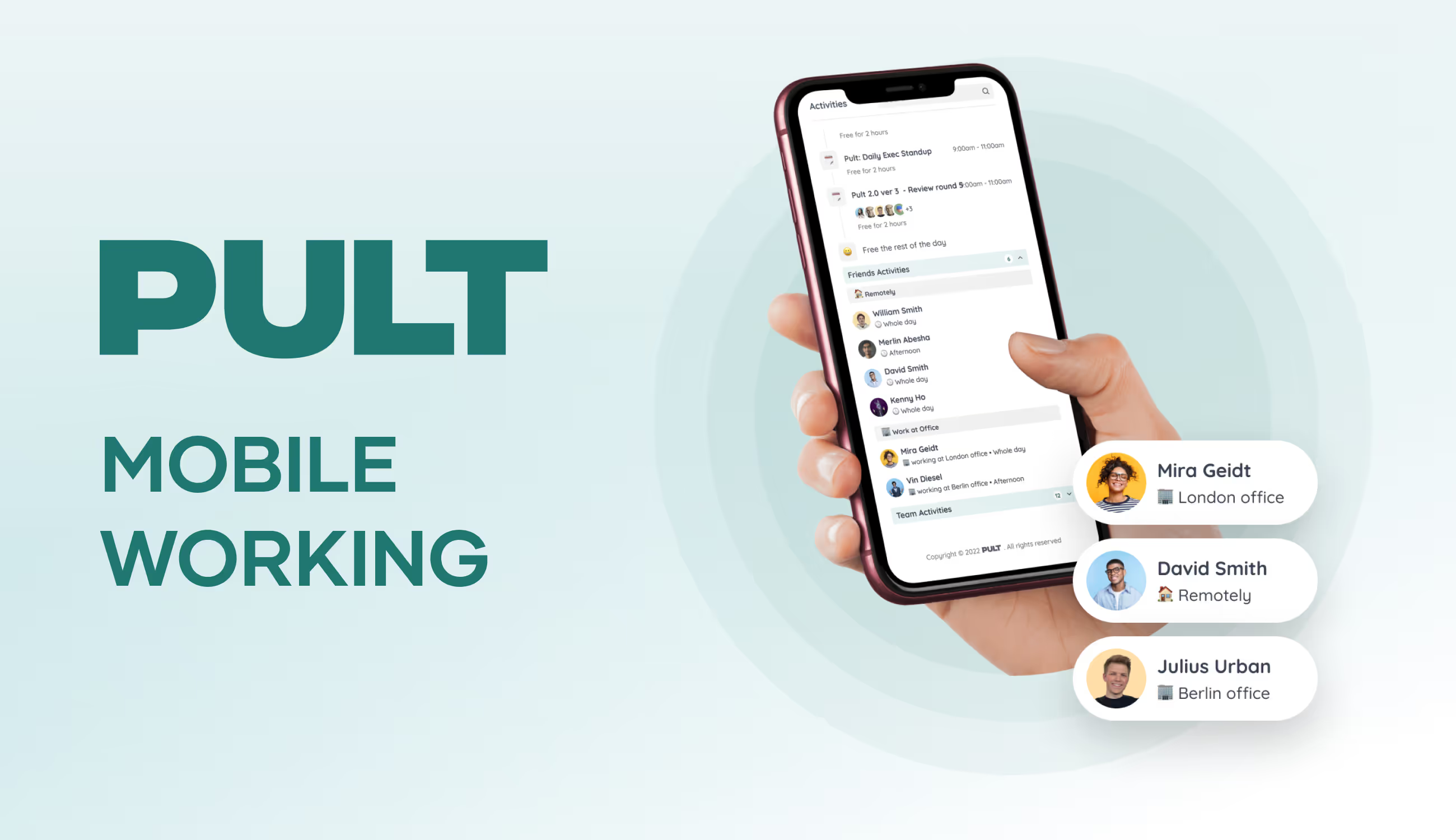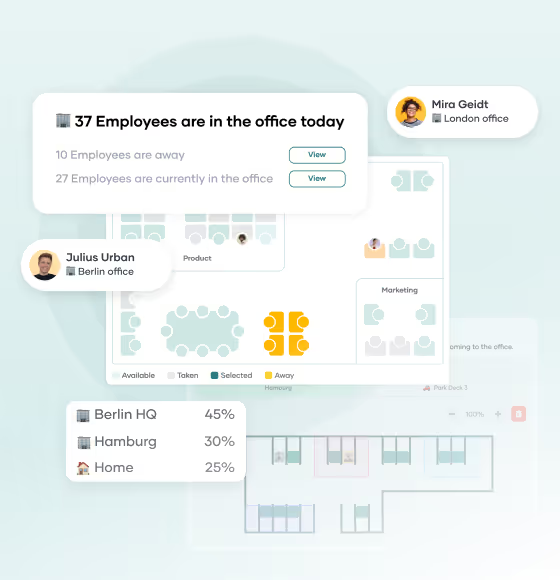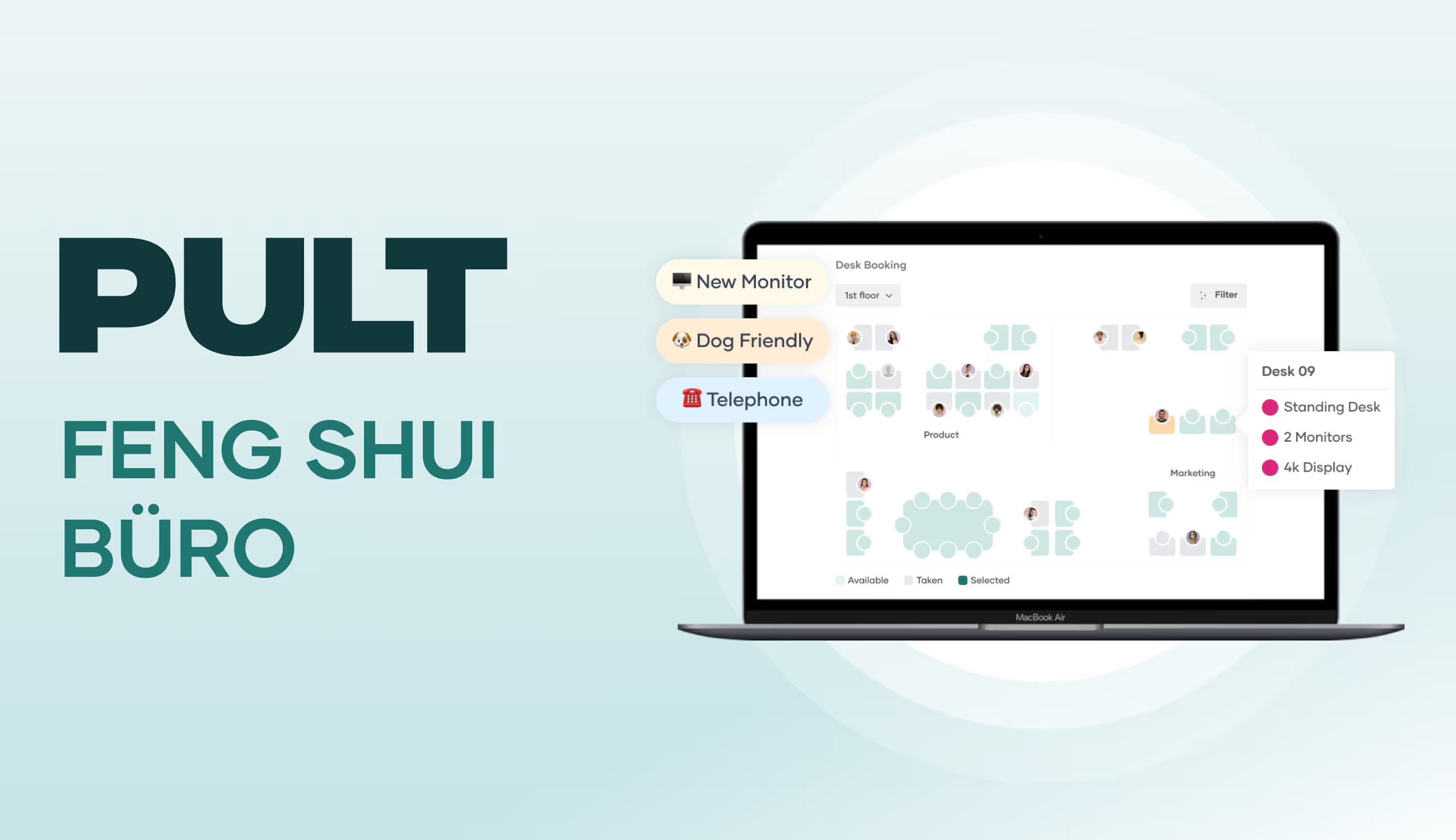This is mobile working | For companies

Mobile working: Definition, differences to home office and legal issues
58% of all German companies now allow mobile working, whether from the office, in the home office, on the road or even abroad. In this article, you will find out how mobile working works today in legal, technical and practical terms.
{{hint-box}}
What is mobile working?
Mobile working is the ability to perform work from any location, usually with the help of a laptop, smartphone and internet connection. Mobile working can completely or partially replace presence in the company.
In contrast to traditional office work, there is not necessarily a fixed workplace in the company. In hybrid models, several employees often share a desk in the office at different times, as they otherwise work remotely.
Tip: Find out how desk sharing works here.
As a rule, no specific work location is prescribed for mobile working. The only requirements are that there is a connection to the company, availability is ensured and the assigned tasks are completed.
What is the difference between home office and mobile working?
Mobile working is distinguished from the term home office in that home office generally refers to working from home. In fact, home office is a special case of teleworking.
In Germany, teleworking is formally defined (Section 2 (7) of the Workplace Ordinance) as a workstation permanently set up by the employer in the employee's private area. For this purpose, a fixed work location (usually the employee's own home) is contractually agreed and equipped with office furniture and technology by the employer.
Teleworking/home office is subject to the strict requirements of the Workplace Ordinance and occupational health and safety regulations; for example, ergonomic furniture must be provided and a risk assessment of the home workplace must be carried out.
Mobile working, on the other hand, is not regulated by the Workplace Ordinance. It mainly takes place outside fixed workspaces, in changing locations, and there is no legal definition for it.
In short: home office (teleworking) means working at a clearly defined location (the home office) with appropriate equipment provided by the employer, whereas mobile working offers a free choice of location.
Important: Even if no fixed office regulations apply to the workplace for mobile working, the general labour laws remain fully applicable. These include, for example, the Working Hours Act (ArbZG) with maximum working hours, rest breaks and the ban on working on Sundays. The Occupational Health and Safety Act also applies, i.e. the employer has a duty of care and must also protect the health of its employees during mobile working.
What legal regulations apply to mobile working?
There is currently no legal entitlement to mobile working (or home office) in Germany. This means that employees can express the wish to work from home or from other locations, but the employer decides voluntarily whether to allow this.
The employer may also informally reject a request for mobile working without giving reasons. In practice, however, many companies allow home office arrangements and mobile working in order to be more attractive to skilled workers and increase employee satisfaction.
Mobile working in the coalition agreement
In the coalition agreement of the last German government (20th legislative period, 2021-2025), it was agreed to introduce a "discussion entitlement" for mobile working. According to this, employees in suitable jobs should be entitled to negotiate home office/mobile working.
The employer would then only be allowed to refuse a request if there are operational reasons to the contrary and arbitrary refusals would be inadmissible. However, as of July 2025, there is still no specific law on this.
The following therefore still applies: Anything that is not regulated by a collective agreement, works agreement or employment contract remains a matter for negotiation between employer and employee. Employers are not obliged to allow their employees to work from home, nor can employees unilaterally insist on this. Conversely, the following also applies: employers cannot simply force their employees to work from home without a corresponding agreement. Both sides must agree.
What working hours apply to mobile working?
The statutory working hours must be observed for mobile working. The following applies:
- A maximum of 8 hours per working day (up to 10 hours in exceptional cases)
- At least 11 hours of rest between two working days
- Overtime and work on Sundays and public holidays are only permitted within narrow limits
- The employer may not demand constant availability outside of working hours
In practice, time recording in particular poses a challenge: Employers are obliged to provide a reliable system for recording working hours that also works for mobile working. As a rule, time recording software or trust-based working time with independent recording is used here. It is important that overtime and breaks are documented in a traceable manner, also for health and safety reasons.

Accident and insurance cover for mobile working
Since the Company Reform Act 2021, extended accident insurance cover has been in place for mobile working and working from home. Accidents at work in the home office or while travelling as part of mobile working are now insured in the same way as at work.
This means that if someone is injured while working at home or on the direct route to nursery school to drop off their child before starting work, statutory accident insurance covers them in the same way as if they were in the office.
However, purely private activities during working hours (e.g. an accident while cleaning during a break) are not covered. Overall, the new regulation has significantly improved cover for working from home.
Occupational health and safety for mobile working
The health and safety regulations also apply at home and at other workplaces. Although the Workplace Ordinance does not apply to mobile working, employers must assess hazards and instruct their employees on ergonomic and healthy working practices, even when working from home.
In fact, this is often done by means of questionnaires and voluntary commitments by employees, as employers are not allowed to inspect private homes without further ado and this would not be practical.
Who is responsible for data protection when working remotely?
Employers remain responsible for data protection and IT security in the case of mobile working. Companies must therefore ensure that no unauthorised third parties can access company data when working remotely.
This is achieved by using secure passwords, encrypted connections (VPN) and devices with fingerprint sensors or facial recognition. Employees must be trained accordingly, as the daily responsibility for compliance with data protection lies with the employees.
What applies to mobile working in the public sector?
There are special regulations in favour of mobile working in the public sector. According to § 16 para. 1 sentence 2 of the Federal Equal Opportunities Act (BGleiG), departments must enable employees with family or caring responsibilities to work from home, insofar as this is possible for official reasons.
This means that civil servants and employees in the public sector who are caring for children or relatives, for example, have a preferential right to home office/mobile working, provided there are no compelling official reasons not to do so.
In general, many public authorities are catching up on this topic: Numerous service agreements in federal and state authorities now regulate home office options. For example, some authorities allow mobile working for up to 4 days a week as long as the work processes allow it (there are differences depending on the authority).
What equipment do you need for mobile working?
The basic requirement for mobile working is a functioning mobile office, which usually consists of a laptop/computer, internet access and telephone (or smartphone). Headsets and possibly a portable WLAN router are also used, depending on where you are working from.
Who provides the equipment for mobile working?
Employers are generally responsible for providing the necessary work equipment. In traditional home office agreements, many companies therefore equip their employees with a laptop, screen, keyboard/mouse and sometimes an office chair. In the case of mobile working, the employer should at least provide the IT equipment or make financial contributions.
Some companies rely on the "Bring Your Own Device (BYOD)" principle, where employees use their private devices. However, appropriate compensation is required here (e.g. reimbursement of costs) and special security precautions must be taken (e.g. separate business profiles on the private device) so that data protection and company data remain protected.
Internet connection and software access
A fast and stable internet connection is one of the most important prerequisites for mobile working in order to be able to reliably handle video calls and cloud access to data and software.
Many employers support their employees here, for example by covering part of the internet costs or providing company data cards. There are no standardised legal regulations on this, so it is advisable to set out such issues in a company or remote working agreement.
On the software side, mobile employees should have access to all important applications. Cloud services and software for communication and collaboration (e.g. Teams, Slack, VPN access to the company network) are typical tools for working together from anywhere.
Tip: To ensure that those returning to the office from mobile working can reliably find a free desk, they should book this in advance using software.
Does the home office flat rate also apply to mobile working?
The home office allowance only applies to days on which you have worked predominantly in your home, i.e. for real home office days.
- Since the 2023 tax year, you can claim €6 per day, up to a maximum of 210 days per year (max. €1,260), for tax purposes - if you mainly work from home.
- The lump sum only applies to days on which the business activity is predominantly carried out in the home office, not if you are mainly travelling.
- This is not deductible: Days on which you work on the road (e.g. in a café, customer visits, mobile work without a home office) do not count towards the home office allowance and are therefore not tax deductible.
Mobile working abroad and workation
A special case of mobile working is working from abroad, either for a longer period of time or as part of a so-called workation. Workation is made up of work and vacation. This means that employees work temporarily from a holiday location or from abroad without taking holiday days.
Example of mobile working abroad:
An employee spends two weeks on holiday in Mallorca and then stays on site for another week to continue working normally from there before returning.
What is the maximum number of days German employees are allowed to work abroad on a mobile basis?
For tax purposes, there is a clearly defined limit for mobile working abroad: anyone who spends more than 183 days within a given year in another country and works there may be liable to pay tax there under the relevant double taxation agreement. This limit is internationally recognised and represents a legally binding threshold.
Caution is also required with regard to social security: The so-called A1 certificate applies within the EU. It ensures that employees remain in the German social security system during a temporary posting (maximum 24 months). Employers must apply for this certificate and ensure compliance.
National regulations also apply outside the EU: Among other things, work visas or residence permits may be required here if employees want to work locally for a longer period of time. Many companies therefore limit workation periods to a maximum of 30 to 90 days per year in order to avoid tax, labour law and insurance problems as far as possible.

In which industries and professions does mobile working occur?
Mobile working is particularly common in professions in which work can be organised in a knowledge-based, digital or location-independent manner. Typical sectors for mobile working:
- IT and software development
- Media, graphics and design
- Marketing and communication
- Advice and consulting
- Finance and banking sector
- Administrative office work
- Research and education (e.g. e-learning, universities)
- Customer service (e.g. via chat, email, telephone)
- Sales and field service
These areas often only require a computer with an internet connection, which is why the place of work is of secondary importance.
Conclusion: Using mobile working correctly
Mobile working has developed from an exception to an integral part of modern work. It offers enormous advantages for employees: they can choose and organise their own working hours and location, achieve a better work-life balance and save time and commuting costs.
The advantages are higher productivity and satisfaction when employees can work at times and places of their own choosing. At the same time, however, mobile working also requires a great deal of self-discipline and demarcation in order to avoid slipping into permanent work or being distracted at home.
There are also opportunities for employers: motivated, well-balanced employees, less absenteeism due to commuting stress and savings on office space. Companies can also access a larger talent pool if they offer location-independent working, and skilled workers from more distant regions in particular can be considered as employees.
Companies can now use software to make the coordination of mobile working easier. This makes it possible to see which colleague is working from where. As mobile working and working from home reduce the workload in the office, the figures for office utilisation are also coming under scrutiny: if people are increasingly working from home, will significantly fewer desks be needed in the office?
With PULT, you gain insights into your office utilisation and team behaviour. The software records exactly how much the office is used and how many workstations you need to keep available at peak times. Your employees don't even have to log in: All they need to do is connect one of their devices to the company WLAN. You can find out more about this in PULT Presence.
{{cta}}
Mobile working - frequently asked questions and answers
What is the difference between home office and mobile working?
Home office means working from a fixed workplace at home. Mobile working is more broadly defined, it can take place anywhere: at home, in a café, at a customer's premises or abroad.
How many days are you allowed to work from home?
There are no legal upper limits and, in principle, employers and employees can agree to work completely remotely.
Does mobile working have to be regulated in the employment contract?
It is not mandatory, but highly recommended. A clear regulation protects both sides when it comes to questions about working hours, availability, technology or insurance.
Can my boss prohibit mobile working?
Yes, unless there is an agreement to the contrary (e.g. in the employment contract or collective labour agreement). There is currently no general right to mobile working in Germany.
What working hours apply to mobile working?
The same legal requirements apply as in the office, e.g. a maximum of 10 hours per day and 11 hours of rest. Break regulations and documentation requirements also remain in place.
A new hybrid workplace experience is coming. Start Now. 🎉





















.avif)





